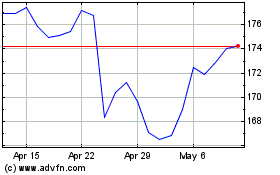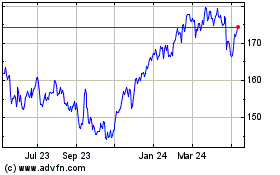Canada Rejects Calls for Legislation to End Railway Strike
November 22 2019 - 4:23PM
Dow Jones News
By Paul Vieira
OTTAWA -- Canada brushed off demands from business groups and
regional political leaders to introduce legislation to end a labor
dispute between Canadian National Railway Co. and over 3,000
unionized employees that is disrupting the economy.
Canada Transport Minister Marc Garneau said the government has
concluded that the quickest way to resolve the strike, in its
fourth day, is to continue collective bargaining rather than a
law.
"This is a process we believe in," Mr. Garneau told reporters in
Montreal on Friday. "We are making both sides very aware of the
impact this is having on Canadians. They are not only
inconvenienced, but in some cases pretty stressed."
Canadian National, the country's largest railroad operator,
carries everything from Canada's crude-oil exports to automobiles
headed to U.S. and Canadian cities, operates the country's biggest
rail network, stretching from Vancouver to Halifax and from Chicago
to New Orleans. The disruption has left a number of industries
scrambling to adjust, particularly agriculture, chemicals, and
energy producers.
Teamsters Canada, the union representing roughly 3,000
conductors, trainyard workers and others, said there was no
progress to report in ongoing talks over its key issues in
negotiations, key among them workplace and safety rules.
A Canadian National representative wasn't available for comment.
Earlier this week, the Montreal company said it was seeking support
from workers to have the government appoint an arbitrator to end an
impasse. Canada's government has instead offered its chief mediator
to help work through issues.
Mr. Garneau's comments came as pressure ramped up on the Liberal
government to directly intervene and warnings emerged from
economists about the negative impact a prolonged strike could have
on the economy.
Quebec Premier François Legault called for intervention from
Canadian officials, warning the province's farmers are facing
hardship because of a shortage of propane. Farmers use propane to
dry grain. Alberta Premier Jason Kenney has complained the strike
has added to woes facing his province's struggling energy
sector.
Canada's main small-business lobby and a group representing
fertilizer producers also pressed Prime Minister Justin Trudeau to
force striking Canadian National workers to return to work.
TD Bank economist Brian DePratto said a strike carrying on until
the end of this month could lead to an economic hit of up to 2.2
billion Canadian dollars ($1.65 billion). The impact would reach up
to C$3 billion if the labor dispute extends into early December, he
said.
Canada's legislature isn't scheduled to reconvene until Dec. 5.
Parliament dissolved in September for the general election in
October, when Mr. Trudeau's Liberal returned to power in a minority
government.
(END) Dow Jones Newswires
November 22, 2019 16:08 ET (21:08 GMT)
Copyright (c) 2019 Dow Jones & Company, Inc.
Canadian National Railway (TSX:CNR)
Historical Stock Chart
From Mar 2024 to Apr 2024

Canadian National Railway (TSX:CNR)
Historical Stock Chart
From Apr 2023 to Apr 2024
